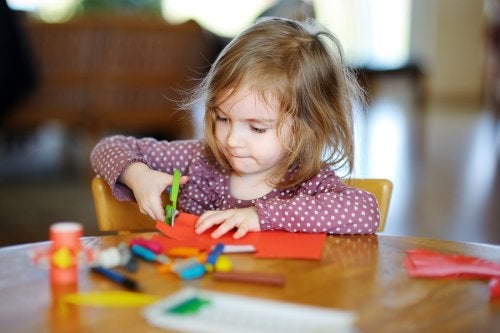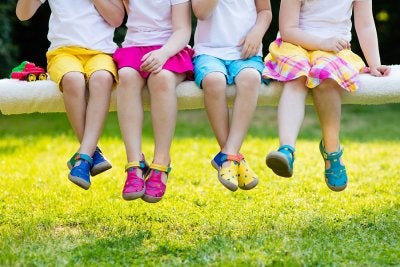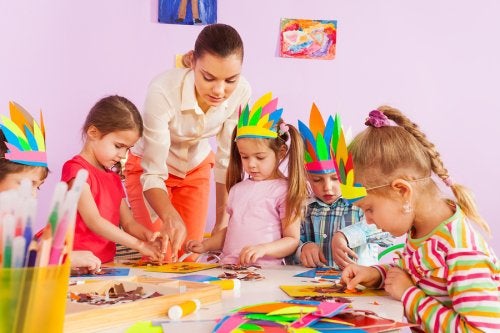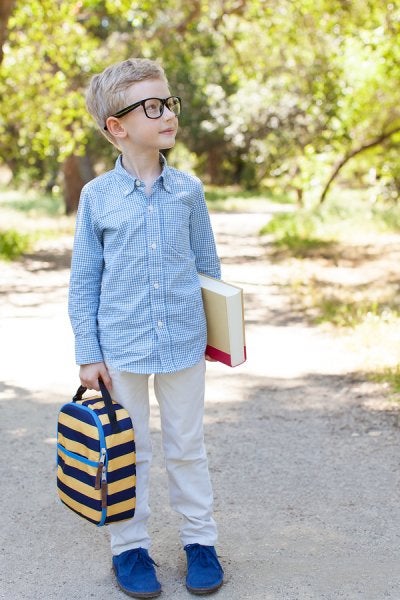-
Is Your Child Gifted?
It’s not uncommon for individuals to have questions about what is or isn’t normal for a child. After all, many parents want to do what they can to ensure that their child grows up happy, healthy, and well-rounded. In particular, some common questions that parents have when it comes to their child regard what behaviors and developments are considered normal. If your child is enrolled in first grade, kindergarten, pre-k, or preschool in Pembroke Pines , and you’re wondering if his level of development is normal for his age, then there are some indications that you can watch for which may show that he is gifted.
What qualifies as gifted varies depending on where you live and who you ask. However, some signs that can indicate that your child may be gifted include good communication skills, a love of reading, the ability to learn information quickly, and strong problem-solving skills. A child that is gifted may also embrace intellectual challenges, understand ideas easily, and have a high level of curiosity.

-
Motor Skill Milestones in Pre-K
Kids in pre-K go through an amazing number of transitions that always amaze parents. In particular, kids in this age group reach a number of important milestones with their motor skills. If your child is enrolled in pre-K in Pembroke Pines, keep an eye out for these exciting developmental changes.
Both gross and fine motor skills take a leap in pre-K. In terms of gross motor skills, kids learn to control their running more precisely, including stopping and turning more gracefully. Kids at this age learn to hop on one foot, do somersaults, and bounce, catch, and throw a ball. Parents are also thrilled to discover that their kids can now brush their teeth, comb their hair, and dress themselves without help. Fine motor skill development in pre-K includes learning to print letters, cutting on a line, and using utensils appropriately. Copying shapes, like crosses and squares, also becomes easy.

-
Fun Games That Teach Self-Regulation
One invaluable skill that kids learn in early childhood education is self-regulation. In the classroom, teachers use games to foster this area of child development for better classroom management and so that students get the skills they need to succeed in school as they progress through each grade. Your child’s early childhood education teacher in Pembroke Pines will be happy to discuss the activities he or she uses to teach self-regulation with you. These games are just a few of the fun ways teachers help kids learn the all-important skill of self-regulation and self-control.

Red Light, Purple Light
Many students are familiar with the game red light, green light, but changing the colors makes students adapt while practicing their color recognition. Start by assigning “go” and “stop” meanings to two different colors, and use construction paper in those colors to indicate when students should move and when they should stop. Once the children have automated their responses to those colors, change to two different colors and repeat the activity. This game forces students to concentrate and regulate how they respond to cues.
Simon Says
Simon Says is a classic game that offers many opportunities to practice self-regulation. To succeed, students must listen, concentrate, modify their movements, and follow directions. Giving students each a chance to be Simon further increases the chances to work on self-regulation.
Think or Say
Emotional self-regulation is also an important part of early childhood education. The Think or Say activity makes children think about how they are feeling and is especially ideal for helping kids through their tattling stages. Teachers can introduce many different scenarios and ask the class whether they should say what they are thinking or keep it to themselves. The scenarios can range from dealing with hurt feelings from a classmate to what to do if they see a classmate who is not following directions. Teachers can adapt the scenarios to make them relevant to things that are happening in the classroom.
-
Library Do’s and Don’ts for Kids
Visiting the library is a fun way to encourage your kids to love to read. When your child is working on Kindergarten reading in Pembroke Pines , going to the library to find books to supplement what he or she is learning in the classroom is a perfect way to show your child the world of reading for pleasure.
Help your kindergarten-age child get the most from his or her library experience by teaching the rules in this video before you go. The library is not the place for running or loud noises. Show your child how to treat books with respect and only handle them with clean hands. The library can become a favorite family destination and a good resource for supporting Kindergarten reading once your child learns the rules.
-
Raising a Young Scientist
There are many ways to encourage your child to enjoy science and learning about the world around her. Speak with her Pembroke Pines pre-kindergarten teachers about different educational tactics, and speak with your child about different ways she would like to learn. Perform experiments with each other and have fun researching different topics. Read on for more information about how to raise a young scientist.

Encourage Curiosity
Children are naturally curious and always have questions about how the world works. This natural curiosity is a great gift for your child, so encourage it however and whenever you can. Answer your child’s questions and engage in a dialogue to begin developing her critical thinking skills. If you do not know the answer to a question, then take the opportunity to research together. Ask her pre-k teacher, check out library books, and search websites on the internet. This experience will show your child the value of research and learning.
Speak with Eloquence
Many people speak down to children, because they believe children will not or should not understand an adult conversation. However, children are much smarter than some adults give them credit for, and they can understand complicated situations in much simpler terms. You can help your child foster her communication skills early by speaking to her with eloquence. Treat her like an equal and do not shy away from large words or complicated terms.
Engage in Experiments
There are so many science experiments that can be done at home or in your child’s pre-kindergarten class. These activities are fun and engaging, and you can create a dialogue about how different scientific elements work. For example, you can grab a variety of items and see which ones will float or sink in a bucket of water. Have your child guess which object will float or sink and have her place each one in the water. This can be a wet and silly experiment that will also teach your child more about water and how it reacts to everyday objects.
-
Getting Back to Nature in Childhood
Whether through an after school program in Pembroke Pines , time spent in the backyard, or activities that you arrange for your family, allowing your child to enjoy unstructured play outdoors offers many benefits. Watch this video to learn about the importance of getting back to nature in childhood.
Today, many children are spending less time outside than ever, which may have an impact on their development. For example, executive functions like critical thinking, problem-solving, and organizing are best-developed in outdoor, unstructured play environments. Also, researchers know that the brains of children are developed in a more critical way when exposed to an outdoor setting. Finally, when outside and playing with peers, children tend to utilize critical social skills and competencies that they may not in an indoor, structured play environment.
-
Spotlight on Social and Emotional Development in Pre-K Students
Your rising pre-kindergartener will make some important strides this upcoming school year. Pre-kindergarten programs in Pembroke Pines lay a foundation for both academic success and socio-emotional growth. No two kids progress at the same rate, but in general, you can expect your four-or five-year-old pre-k student to exhibit greater independence in social situations. At the same time, your child may want to please his or her friends and fit in with them.
Pre-k students usually separate more easily from parents, as they grow closer to their teachers and other trusted adults. They may also take the initiative in social situations, such as by suggesting a fun activity, engaging in complex pretend play, and offering to share with a friend. As your child acquires greater mastery with academic skills and self-care abilities, his or her self-esteem will flourish. You’ll start to notice your child using more complex language to express feelings. Although your child will develop better coping skills, he or she will still seek adult guidance when emotions become overwhelming.

-
Tips for Kindergarten Parents
Even if your child has attended structured early childhood education programs, the kindergarten year is an exciting milestone, as it’s considered the first year of formal schooling. Your child’s education in Pembroke Pines encompasses important academic skills like math and literacy, but it also involves personal growth and socio-emotional development. Encourage your child to reach for the stars, but have reasonable expectations and give your son or daughter the freedom to simply enjoy childhood.

Nurture your child’s independence.
When your son or daughter reaches kindergarten age, he or she will start displaying greater independence. Encourage this by teaching important self-care skills. Teach your child how to button up clothes, tie shoes, and wash hands. Position the milk jug and snacks on a lower shelf in the fridge, and let your child serve him-or herself. Spills are to be expected, as your child is still learning self-care skills.
Read every day.
Reading with your child every day is one of the most impactful ways to support your child’s education. It lets your son or daughter naturally absorb the rhythm and structure of sentences, and simply get absorbed in the magical world of stories. Reading with your child nurtures the close bond you share with him or her. It sparks your child’s imagination and entices his or her curiosity.
Create a musical home.
Every child has artistic tendencies, and nurturing them supports your child’s self-esteem and sense of wonder. Music also encourages a strong vocabulary, better memory, and dynamic social skills. Sing with your child in the car, or start a band in the kitchen by tapping on overturned pots and drinking glasses. Talent is not important, but enthusiasm is.
Talk often.
When your child was an infant, you probably learned that talking to him or her frequently supported healthy development. During the kindergarten age, this fact still holds true. Encourage your child’s oral language skills by actively listening to him or her, asking open-ended questions, and letting your child know that what he or she says is important to you.
-
Answering Common Questions About Pre-Kindergarten Programs
Pre-kindergarten programs are offered to children in the year before they enter kindergarten. Children will be around four years old, which is when they are beginning to develop a better understanding of the world around them. Pre-kindergarten programs in Pembroke Pines can foster their understanding and provide the necessary academic and social education to help children succeed. Let’s take a look at the answers to some common questions about pre-kindergarten programs.

Do they provide academic value?
Pre-kindergarten programs are meant as a stepping stone into kindergarten education. These programs help children develop the much-needed foundations of kindergarten math and reading skills. Children in pre-kindergarten programs will have the opportunity to learn pre-math and pre-reading skills that will also encourage them to take an active role in the world around them.
Do they provide active play?
Active play is essential for growing children, because it encourages the development of gross and fine motor skills. Gross motor skills include larger movement skills, such as throwing a ball or performing somersaults. Fine motor skills include smaller movements needed for future schooling, such as holding a pencil, cutting with scissors, and copying basic shapes. Pre-kindergarten programs will feature a lot of active play to encourage these skills.
Do they provide social interaction?
Pre-kindergarten is a great place for children to develop and continue developing their social skills. Pre-kindergarten programs provide many opportunities to learn teamwork, communication, and social expression. This is a critical time in children’s social development, because it’s when children begin to cement their understanding of right and wrong and how to respond to other kids and adults.
Are they required education?
Pre-kindergarten programs are typically voluntary, and they may be classified as voluntary pre-kindergarten, or VPK. Though voluntary, VPK is an important program for children entering kindergarten. New education standards have made kindergarten curriculum more intense, and children must be fully prepared before entering their kindergarten class. Pre-kindergarten programs offer children the academic education, social interaction, and the foundational skills they will need to succeed in kindergarten and beyond.
-
Getting Kids Ready for Summer Day Camp: Tips for Parents
School will be out soon, and summer camp will begin shortly after. This can be an exciting time for your child, because he can stay busy during the summer and engage in fun summer camp activities like field trips and sports. Whether your child has been to a summer camp near Pembroke Pines or not, there are certain tips that can help prepare your child for his upcoming summer. Read on for helpful tips to get your child ready for summer camp.

Tip #1: Involve Your Child
It is important to involve your child in the decision of summer camp. If your child is excited about the different activities, then he is more likely to enjoy his time away from home. Research different summer day camps and speak with each program’s administrator. Find out what types of summer activities are planned for the kids, and ask your child what he would prefer. Also, consider the potential field trips that each day camp offers to provide further incentive for your child to attend. This will make the summer much more enjoyable for everyone.
Tip #2: Pack Summer Essentials
There are certain summer essentials that you and your child should always have when you leave the house. Ensure that your child has a tube or bottle of sunblock in his backpack to reapply, and apply it before leaving the house in the morning. Pack a refillable water bottle and a light lunch or snack to keep your child hydrated and full of energy. Encourage your child to wear a hat for additional sun coverage while playing outside. This can prevent sunburns and heat exhaustion.
Tip #3: Meet the Instructors
Once you and your child have picked a summer camp, make an appointment to meet with the instructors or a lead administrator. This meeting is a great opportunity to learn more about the leaders your child will be with all summer, and it helps your child feel more comfortable attending the upcoming program.
RECENT POSTS
categories
- Uncategorized
- Early Learning Center
- Pre-K
- Children
- Child Care Center
- Preschooler
- Preschool Blog Category | Tanglewood Academy
- Preschool Lunch
- Tanglewood Academy
- After-School Program
- Toddler School
- Early Childhood Education
- preschool activities
- pre-kindergarten
- childhood education
- pre-kindergarten programs
- Children’s education
- enrichment opportunities
- Kindergarten
- Nurturing Education Environment
- Toddler Care
- Child Separation Anxiety
- Toddlers
- Summer camp
- summer activities
- VPK
- Voluntary Pre-K
- Outdoor Activities
- Smart Strategies
- Tie Shoes
- Snacks
- Physical Activities
- Education
- Enrichment Activities for Kids
- Early Education Activities
- Preschool Curriculum
- Classroom Learning
- APPLE accreditation
- Language Comprehension
